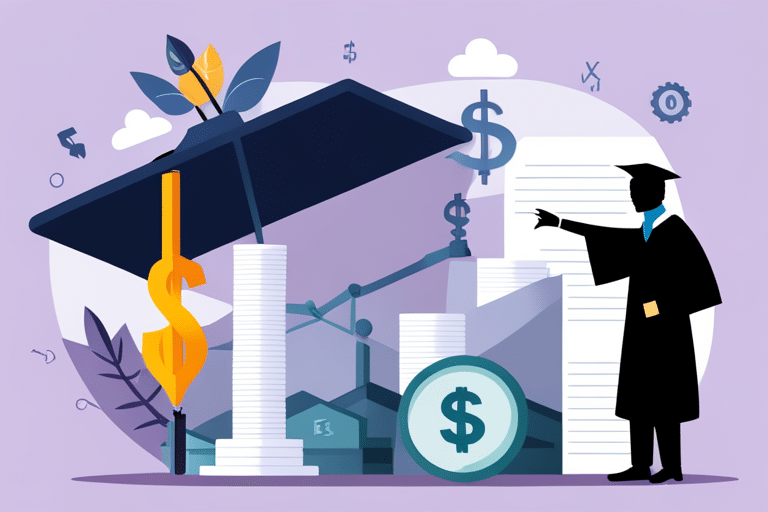Budgeting Strategies to Manage Student Loan Paymentsps://schema.org”, “@type”: “NewsArticle”, “headline”: “Tips for Managing Your Student Loans During Economic Downturns”, “image”: [“https://moneywisehb.com/wp-content/uploads/2023/08/Create_an_image_of_a_20230827180110.png”], “datePublished”: “2023-08-27T18:03:30.970754”, “dateModified”: “2023-08-27T18:03:30.970754”, “author”: {“@type”: “Organization”, “name”: “MoneyWiseHB.com”, “url”: “https://moneywisehb.com/about/”}, “about”: {“@type”: “Thing”, “name”: “Debt”}, “mentions”: [{“@type”: “Thing”, “name”: “”student loans during economic downturns””}, {“@type”: “Thing”, “name”: “”loan repayment options during economic downturns””}, {“@type”: “Thing”, “name”: “”managing student loans with effective strategies””}], “keywords”: “Student Loan Management, Interest Rate Fluctuations, Loan Repayment Options”, “educationalUse”: “Manage student loans during recession.”}
Hey there, student loan warrior!
Did you know that during economic downturns, managing your student loans becomes even more crucial?
But don’t worry, we’ve got your back with some awesome tips to help you navigate these challenging times.
From evaluating repayment options to exploring loan forgiveness programs, we’ll show you how to take control of your finances like a boss.
So buckle up and get ready to conquer those student loans with style and finesse!
Key Takeaways
- Fluctuating interest rates can affect loan payments
- Stay informed about market trends and seek advice from financial experts
- Refinancing or consolidating loans when interest rates are low can save money
- Create a budget that aligns with your financial goals
Understanding the Impact of Economic Downturns on Student Loans

Understanding the impact of economic downturns on student loans can help you make informed decisions and manage your loan repayment effectively. Let’s dive into it!
When the economy takes a tumble, interest rates may fluctuate, affecting your loan payments. It’s crucial to understand how these changes might impact you financially. Keep an eye on the market trends and seek advice from financial experts who specialize in student loans.
By staying informed, you can strategically plan your repayment strategy and potentially save money by refinancing or consolidating your loans when interest rates are low.
Remember, managing your loan repayment doesn’t have to be daunting. Stay proactive, explore all available options, and create a budget that aligns with your financial goals.
With a little know-how and some creative thinking, you’ll navigate through any economic downturn like a champ!
Evaluating Your Repayment Options During an Economic Downturn

Hey, you, fellow student loan warrior!
So, you’re trying to navigate through an economic downturn and wondering how it’s going to affect your repayment plans? Well, fear not! In this discussion, we’ll dive into the world of income-driven repayment plans that can help ease your financial burden.
We’ll also explore the considerations of loan forbearance during tough times. Sometimes, putting your loans on hold temporarily can be a smart move to give yourself some breathing room.
And even if the economy is in a downturn, we’ll discuss if refinancing could still be a smart move. It’s important to weigh the pros and cons before making any decisions.
Trust me, by the end of this conversation, you’ll feel like a pro at managing your student loans during any economic rollercoaster ride!
Income-Driven Repayment Plans
To better manage your student loans during economic downturns, you should consider enrolling in income-driven repayment plans. These nifty plans take into account your current income and adjust your monthly payments accordingly, making them more manageable when times are tough. Here’s why you should give them a shot:
-
Loan Forgiveness: Some income-driven plans offer loan forgiveness after a certain number of qualifying payments. This means that if you stick to the plan and make all the required payments, a portion of your loan could be forgiven. It’s like magic!
-
Repayment Options: Income-driven plans come in different flavors, so you can choose the one that suits you best. Whether it’s Pay As You Earn (PAYE), Income-Based Repayment (IBR), or Revised Pay As You Earn (REPAYE), there’s an option for everyone.
-
Flexibility: If your income takes a nosedive, fear not! Income-driven plans allow for adjustments based on changes in your financial situation. So relax and breathe easy.
Now that you know all about income-driven repayment plans and their benefits, let’s dive into another important consideration – loan forbearance.
Loan Forbearance Considerations
When considering loan forbearance, it’s important to understand the potential impact on your financial situation. Loan forbearance can provide temporary relief by allowing you to pause or reduce your monthly payments. However, it’s essential to weigh the pros and cons before making a decision. Take a look at this handy table that highlights some key considerations:
| Loan Forbearance Considerations | Impact |
|---|---|
| Pause in payments | Immediate relief, but interest may still accrue |
| Reduced payments | Lower monthly burden, but longer repayment period |
| Extended forbearance | Continued relief, but increased overall loan cost |
| Credit implications | Possible negative effect on credit score |
Remember, managing loan payments during an economic downturn requires careful thought and consideration of all available options. While loan forbearance can offer temporary respite, it’s crucial to explore other alternatives such as income-driven repayment plans or refinancing during downturns.
Now let’s dive into the next section about ‘refinancing during downturns’ and discover how it can help you navigate through challenging times with your student loans.
Refinancing During Downturns
If you’re considering refinancing during a downturn, it’s important to understand how it can potentially benefit your financial situation. Here are some benefits of refinancing that you should know:
-
Lower Interest Rates: By refinancing, you may be able to secure a lower interest rate on your loan, which can save you money in the long run.
-
Improved Cash Flow: Refinancing can help lower your monthly payments, giving you more breathing room in your budget.
-
Consolidation of Debt: If you have multiple loans, refinancing allows you to combine them into one loan with a single monthly payment.
To be eligible for refinancing, there are some criteria that lenders typically look for:
-
Good Credit Score: Lenders want to see that you have a history of responsible borrowing and repayment.
-
Stable Income: Demonstrating consistent income shows lenders that you’ll be able to make timely payments.
-
Loan-to-Value Ratio: Lenders often require a certain amount of equity in your home or property as collateral.
Budgeting Strategies to Manage Student Loan Payments in an Economic Downturn

Hey there!
So, let’s dive into two important strategies that can help you manage your student loan payments during an economic downturn: Emergency Loan Deferment and Income-Driven Repayment Options.
Emergency Loan Deferment allows you to temporarily postpone making payments on your loans if you’re facing financial hardship, giving you some breathing room.
On the other hand, Income-Driven Repayment Options are designed to make your monthly payments more affordable by taking into account your income and family size.
These options can be a real game-changer when it comes to navigating tough financial times, so let’s explore them further!
Emergency Loan Deferment
During an economic downturn, it’s important to consider emergency loan deferment as a way to manage your student loans. Think of it as hitting the pause button on your loan payments until you’re in a better financial position.
Here are some things to keep in mind:
-
Temporary Relief: Emergency loan deferment allows you to temporarily stop making payments on your student loans during times of financial hardship.
-
Eligibility Criteria: To qualify for emergency loan deferment, you’ll typically need to prove that you’re experiencing financial difficulties like job loss or reduced income.
-
Financial Aid Options: While your loans are in deferment, explore other financial aid options such as scholarships or grants that can help ease the burden.
Income-Driven Repayment Options
Consider exploring income-driven repayment options to help manage your student loan payments more effectively. With these plans, you can base your monthly payment on a percentage of your discretionary income, making it easier to budget and handle other expenses. Plus, if you meet certain criteria, such as working in public service or making consistent payments for a set period of time, you may even be eligible for loan forgiveness.
To give you an idea of the different repayment plans available, here’s a table breaking down the options:
| Repayment Plan | Eligibility | Loan Forgiveness |
|---|---|---|
| Income-Based | High debt-to-income ratio | After 20-25 years |
| Pay As You Earn | Partial financial hardship | After 20 years |
| Revised Pay As You Earn (REPAYE) | No income requirement | After 20-25 years |
| Income-Contingent | No income requirement | After 25 years |
| Income-Sensitive | Low income | None |
Exploring Loan Forgiveness Programs During Economic Downturns

If you’re having financial difficulties, it might be worth looking into loan forgiveness programs during economic downturns. These programs can provide relief and help ease the burden of your student loans.
Here are some things to keep in mind when exploring loan forgiveness options:
- Loan Forgiveness Eligibility:
- Check if you meet the criteria for specific forgiveness programs, such as Public Service Loan Forgiveness or Teacher Loan Forgiveness.
-
Look into income-based repayment plans that offer loan forgiveness after a certain number of years.
-
Loan Forgiveness Application Process:
- Gather all necessary documents, such as proof of employment or certification forms.
- Follow the application instructions carefully and submit your application within the designated timeframe.
- Keep track of your progress and any updates from your loan servicer regarding the status of your application.
By understanding loan forgiveness eligibility and navigating the application process, you can take steps towards reducing your student loan debt.
Now let’s move on to discussing how to communicate with loan servicers during an economic downturn.
Communicating With Loan Servicers During an Economic Downturn

Hey there, it’s time to get chatty with your loan servicer during these economic downturns!
We’re diving into the fascinating world of Loan Servicer Communication Strategies and Relief Options During Downturns.
So grab a seat, because we’ve got some lighthearted and unconventional tips coming your way that will help you navigate this tricky situation like a pro.
Let’s make those loan servicers say ‘wow’ when they see your communication skills!
Loan Servicer Communication Strategies
Staying in touch with your loan servicer is crucial during economic downturns. But don’t worry, managing your loan servicer relationships doesn’t have to be a snooze-fest. Here are some lighthearted and creative communication strategies to keep in mind:
-
Be proactive: Don’t wait for your loan servicer to reach out to you. Take the initiative and contact them first.
-
Stay informed: Keep up-to-date with any changes or updates regarding your loans. Knowledge is power!
-
Ask questions: If something isn’t clear, ask! Your loan servicer is there to help you navigate the confusing world of student loans.
Relief Options During Downturns
Explore the various relief options available to you during economic downturns and take advantage of those that best suit your needs. When it comes to managing your student loans, there are a few tricks up your sleeve.
First off, let’s talk about loan forgiveness. Wouldn’t it be nice if all your student loans magically disappeared? Well, with certain relief options, that dream could become a reality. Loan forgiveness programs exist for specific professions like teachers or public servants. So, if you’re in one of these fields and meet the requirements, say goodbye to your loans!
But don’t fret if you don’t qualify for loan forgiveness because there are still other relief options out there for you. Now let’s dive into exploring loan deferment and forbearance options during an economic downturn…
Exploring Loan Deferment and Forbearance Options During an Economic Downturn

If you’re facing financial difficulties due to an economic downturn, you can consider exploring loan deferment and forbearance options for managing your student loans. These options can provide temporary relief by allowing you to pause or reduce your loan payments until your financial situation improves.
Here are some things to keep in mind when considering these options:
- Loan Deferment:
- Allows you to temporarily stop making payments on your loans.
- Interest may not accrue on subsidized federal loans during deferment.
-
You may need to meet certain eligibility criteria, such as being enrolled in school or experiencing unemployment.
-
Loan Forbearance:
- Provides a temporary reduction or suspension of loan payments.
- Interest usually continues to accrue on all types of loans during forbearance.
- You may need to demonstrate financial hardship or other qualifying factors.
Seeking Employment and Income Opportunities to Manage Student Loans in an Economic Downturn

Looking for employment and income opportunities can help you navigate your student loans during an economic downturn. But here’s the thing – it doesn’t have to be boring or conventional! Think outside the box, my friend.
Instead of just scrolling through job boards, why not explore some unconventional income strategies? Ever thought about starting a side hustle? Maybe you’re a talented painter, baker, or even a juggler! Use those skills to make some extra cash while paying off your loans.
And hey, don’t forget about the power of networking. Reach out to friends and family members who might have employment opportunities for you. It’s all about being creative and proactive during tough times.
Exploring Loan Consolidation Options During Economic Downturns

So, you’ve been exploring different ways to manage your student loans during an economic downturn. Seeking employment and income opportunities was a great start! Now, let’s dive into the world of loan consolidation options. Trust me, it’s like finding a hidden treasure chest full of benefits!
Here are some benefits of loan consolidation:
-
Simplified Repayment: Say goodbye to juggling multiple loan payments like a circus performer. Consolidating your loans means combining them into one manageable monthly payment.
-
Lower Interest Rates: Who doesn’t love saving money? With loan consolidation, you might be able to score lower interest rates and reduce the overall cost of your loans.
-
Flexible Repayment Plans: Want a repayment plan that fits your current financial situation? Loan consolidation offers various options tailored just for you.
Now, let’s talk about the loan consolidation process itself:
-
Gather Your Loan Information: Dust off those old documents and gather all the necessary information about your existing loans.
-
Research Different Lenders: Take a journey through the magical land of lenders and explore their offerings.
-
Apply for Loan Consolidation: Once you’ve found the perfect lender match, fill out their application and cross your fingers for approval!
Tips for Maintaining a Good Credit Score While Managing Student Loans in an Economic Downturn

To maintain a good credit score while navigating student loans during an economic downturn, it’s important to consistently make timely payments and keep your overall debt-to-income ratio in check. But hey, I get it, managing student loans can feel like trying to juggle flaming torches while riding a unicycle on a tightrope.
Fear not! Here are some creative tips for maintaining your creditworthiness and building your credit score even in these challenging times.
First off, consider setting up automatic payments. This way, you won’t have to worry about missing due dates or dealing with late payment fees. Plus, it shows lenders that you’re responsible and serious about paying back your loans.
Next, try reaching out to your loan servicer to see if they offer any hardship programs or deferment options during an economic downturn. These programs can provide temporary relief by allowing you to temporarily pause or reduce your loan payments without negatively impacting your credit score.
Another strategy is to explore alternative ways of building credit. For example, you could open a secured credit card or become an authorized user on someone else’s card (with their permission, of course!). These methods can help establish a positive payment history and boost your creditworthiness over time.
Lastly, keep an eye on your overall debt-to-income ratio. This ratio measures the amount of debt you owe compared to your income. By keeping this ratio in check and avoiding taking on too much additional debt during an economic downturn, you’ll demonstrate financial responsibility and improve your chances of maintaining a good credit score.
Seeking Financial Assistance and Resources During an Economic Downturn

If you’re facing financial difficulties in an economic downturn, it’s worth exploring available resources and seeking financial assistance. Don’t worry, you’re not alone in this boat! There are plenty of financial aid resources out there waiting to lend a helping hand.
Here are a few options for you to consider:
-
Scholarships and grants: These can provide free money towards your education without the burden of repayment.
-
Student loan forgiveness programs: Some professions offer loan forgiveness if you work in underserved areas or for certain non-profit organizations.
-
Government assistance programs: The government offers various forms of aid like income-based repayment plans and deferment options.
Frequently Asked Questions
How Can I Negotiate My Student Loan Repayment Terms During an Economic Downturn?
During an economic downturn, you can negotiate your student loan repayment terms by exploring alternative repayment plans. Don’t be afraid to discuss your options with your loan servicer and find a solution that works for you.
Are There Any Specific Budgeting Strategies That Can Help Me Manage My Student Loan Payments in an Economic Downturn?
To manage your student loan payments in an economic downturn, consider budgeting strategies that align with your financial situation. Additionally, don’t forget about the potential benefits of loan repayment negotiation. Stay proactive and adaptable!
What Are the Eligibility Requirements for Loan Forgiveness Programs During an Economic Downturn?
During an economic downturn, you may wonder about the eligibility requirements for loan forgiveness programs. It’s important to know if you qualify based on your student loans and the specific program criteria.
How Can I Effectively Communicate With My Loan Servicer During an Economic Downturn?
When it comes to effectively communicating with your loan servicer during an economic downturn, remember that open lines of communication are key. Be proactive, stay informed, and don’t hesitate to reach out for assistance.
What Are the Consequences of Loan Deferment and Forbearance Options During an Economic Downturn?
During an economic downturn, loan deferment and forbearance options may seem like a lifeline. However, be aware of the consequences. Interest continues to accrue, increasing the overall amount you owe.
Conclusion
So there you have it, my friend.
Managing student loans during an economic downturn may seem like a daunting task, but fear not!
By evaluating repayment options, budgeting wisely, exploring forgiveness programs, and communicating with loan servicers, you’ll be on your way to financial freedom.
Don’t forget to seek employment opportunities and consider loan consolidation if needed.
And hey, while you’re at it, why not maintain that good credit score?
Remember, there are resources out there to help you through these tough times.
Keep your head up and keep pushing forward!

